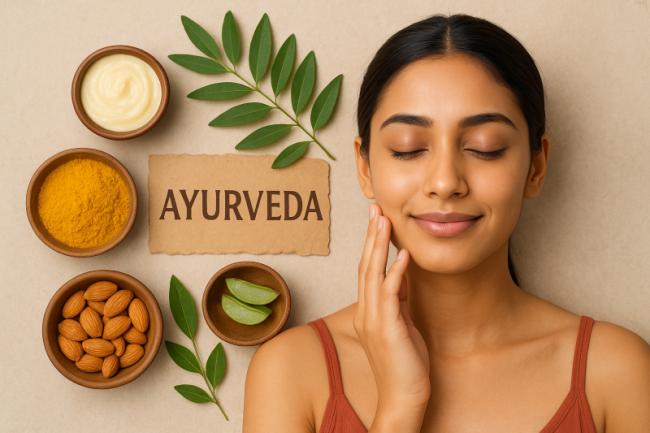By Subhojit Roy | @notintownlive | 09 Oct 2025, 02:28 am
 Ayurveda
Ayurveda
Ayurveda is the traditional system of medicine originating in India. Photo: ChatGPT
Ayurveda, the traditional system of medicine originating in India, presents a holistic approach to skin health that integrates physical, mental, and environmental factors.
In contrast to modern dermatology, which primarily treats visible symptoms, Ayurveda emphasizes internal balance and preventive care. Skin (tvak) is regarded as an organ that reflects the state of internal health, and maintaining its vitality requires harmony among the three doshas — vata, pitta, and kapha — along with proper nutrition, sleep, and emotional stability.
Ayurvedic Understanding of Skin
According to Ayurvedic texts such as the Charaka Samhita and Sushruta Samhita, the skin comprises seven layers, each nourished by metabolic and circulatory processes. Imbalances in the doshas, impaired digestion (agni), and accumulation of toxins (ama) are considered key contributors to dermatological disorders.
Common Ayurvedic treatments include external therapies such as oil massage (abhyanga), herbal pastes, and medicated oils, as well as internal therapies like detoxification (panchakarma), dietary regulation, and herbal supplementation. Preventive measures are central to the Ayurvedic model, emphasizing daily routines (dinacharya) and seasonal adjustments (ritucharya) to sustain optimal skin function.
Modern Lifestyle and Skin Health
Research in dermatological science confirms that environmental and behavioral stressors significantly influence skin integrity and aging. The World Health Organization reports that over 90% of the global population is exposed to polluted air, and multiple studies, including those published in The Journal of Investigative Dermatology, have demonstrated that particulate matter (PM2.5) and nitrogen dioxide accelerate extrinsic aging, pigmentation, and inflammatory conditions such as eczema and psoriasis.
Urbanization, altered sleep cycles, poor dietary habits, and chronic psychological stress have further compounded the burden of skin disease. Reviews in Clinical and Experimental Dermatology (2023) indicate that sleep deprivation impairs epidermal barrier recovery and collagen synthesis, while high-glycemic diets increase acne prevalence. Chronic stress has been linked with elevated cortisol levels and exacerbation of inflammatory dermatoses. These findings align with Ayurvedic concepts that connect lifestyle imbalance and emotional distress with visible changes in skin appearance.
Evidence for Ayurvedic Botanicals in Skin Care
Modern pharmacological studies have identified bioactive compounds in several Ayurvedic herbs traditionally used for skin treatment. Turmeric (Curcuma longa) exhibits antioxidant and anti-inflammatory activity through curcuminoids; Neem (Azadirachta indica) shows antibacterial and antifungal properties; Sandalwood (Santalum album), Aloe vera, and Gotu Kola (Centella asiatica) demonstrate wound-healing and collagen-stimulating effects.
A 2022 review in Frontiers in Pharmacology and other studies in Journal of Ayurveda and Integrative Medicine report potential benefits of these botanicals for acne, hyperpigmentation, and premature aging. However, experts highlight the need for standardized formulations, clinical validation, and stringent quality control before widespread adoption.
The Ministry of AYUSH, Government of India, has issued guidelines to ensure safety and authenticity in Ayurvedic preparations, encouraging Good Manufacturing Practices (GMP) and pharmacovigilance in herbal product development. Collaborative research between Ayurvedic and biomedical institutions continues to expand the scientific evidence base for traditional remedies.
Integrative and Preventive Approach
An integrative model combining Ayurvedic lifestyle principles with evidence-based dermatological care is increasingly being explored.
Preventive strategies include:
Routine self-care: Daily oil massage, gentle cleansing, and maintenance of skin hydration.
Dietary management: Consumption of fresh, seasonal foods, antioxidant-rich fruits and vegetables, and limited intake of refined carbohydrates.
Stress reduction: Adoption of yoga, breathing exercises, and mindfulness practices to modulate stress hormones that affect the skin.
Environmental protection: Use of sunscreen, protective clothing, and air filtration in high-pollution environments.
Sleep regulation: Maintaining consistent sleep patterns to support collagen repair and barrier recovery.
This multidimensional approach aligns with the Ayurvedic emphasis on restoring systemic balance rather than treating isolated symptoms.
Contemporary Relevance and Research Needs
As consumer interest in natural and sustainable skincare grows, Ayurveda offers a framework that connects traditional wisdom with modern scientific inquiry. Several universities and research centers in India and abroad are investigating the efficacy and mechanisms of Ayurvedic interventions for dermatological conditions. Nonetheless, significant challenges remain, including variability in herbal composition, lack of large-scale clinical trials, and inconsistent labeling standards.
Integrative dermatology — the collaboration between traditional Ayurvedic practice and conventional medicine — is emerging as a promising field. It focuses on safety, standardization, and personalized care, recognizing that both preventive lifestyle measures and pharmacological interventions are necessary for long-term skin health.
Conclusion
Ayurveda provides a time-tested, holistic approach to maintaining healthy skin through balanced nutrition, regular lifestyle practices, and natural therapies. Modern scientific research increasingly validates the connections between environmental stress, internal health, and skin aging — principles long articulated in Ayurvedic philosophy.
By combining traditional preventive measures with contemporary dermatological evidence, it is possible to establish a sustainable and integrative framework for skin care that emphasizes balance, well-being, and environmental consciousness.
In light of these practices stands Dr. Debabrata Sen, founder of Parampara Ayurveda, whose work bridges classical Ayurvedic insight with modern standards of clinical safety and efficacy. Through his practice, Dr. Sen has guided patients with protocols designed to support, rather than override, the body’s natural endocrine balance—embodying an approach where traditional wisdom meets contemporary care.
- Ind.AI: Sovereignty, jobs, energy and the “What If?”
- Diabetes, muscle loss and the illusion of quick fixes: Why lifestyle correction—not shortcuts—remains our strongest medicine
- Kolkata: Rotary honours Padmashri 2026 awardee Pandit Tarun Bhattacharya
- Kolkata: Rotary Club of Calcutta Pointers, Indian Cancer Society host cancer awareness, screening camp
- ‘This Union budget is about building capacity, not chasing short-term consumption’
- AI will replace surgeons, coders — and billions of jobs, warns Sraddhalu Ranade at MCHD-SKC Memorial Lecture
- Religion without servility: Journalist Anshul Chaturvedi on why Vivekananda speaks to believers and atheists alike
- Culturist Sundeep Bhutoria unveils anthology When Gods Don't Matter at Jaipur LitFest 2026
- Kolkata CP urges elderly to stay alert against digital scams at ‘Pronam’ interaction
- Sona Incubations, Salem picks 17 startups for Rs 11 Mn DST investment, grant
Air India and Air India Express will present their upgraded cabin products and refreshed on board experiences at SATTE 2026, taking place from 25 February to 27 February 2026 at Yashobhoomi, New Delhi, offering trade partners and visitors a first-hand look at the airlines’ transformation journey.
Montreal: Air Canada and Pegasus Airlines on Thursday announced a new interline partnership aimed at expanding travel options between Canada and Türkiye.
Montreal: Air Canada will expand its Mexico network this summer, increasing seat capacity by 18% compared with last year and launching a new year-round route between Montréal and Guadalajara.





